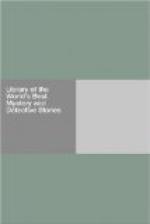“The spider crab holds him by the throat—he is there—at the back—under the rock—wound round by webs—Ah!”
Christian Weber cast a cold glance toward his assistants, who, crowding around, with their eyes sticking out of their heads, were listening intently, and I heard him murmur:
“It’s horrible! horrible!”
Then he resumed:
“You see him?”
“I see him—”
“And the spider—is it big?”
“Oh, master, never—never have I seen such a large one—not even on the banks of the Mocaris—nor in the lowlands of Konanama. It is as large as my head—!”
There was a long silence. All the assistants looked at each other, their faces livid, their hair standing up. Christian Weber alone seemed calm; having passed his hand several times over the negress’s forehead, he continued:
“Agatha, tell us how death befell Sir Hawerburch.”
“He was bathing in the basin of the spring—the spider saw him from behind, with his bare back. It was hungry, it had fasted for a long time; it saw him with his arms on the water. Suddenly it came out like a flash and placed its fangs around the commodore’s neck, and he cried out: ‘Oh! oh! my God!’ It stung and fled. Sir Hawerburch sank down in the water and died. Then the spider returned and surrounded him with its web, and he floated gently, gently, to the back of the cavern. It drew in on the web. Now he is all black.”
The doctor, turning to me, who no longer felt the shock, asked:
“Is it true, Frantz, that the commodore went in bathing?”
“Yes, Cousin Christian.”
“At what time?”
“At four o’clock.”
“At four o’clock—it was very warm, wasn’t it?”
“Oh, yes!”
“It’s certainly so,” said he, striking his forehead. “The monster could come out without fear—”
He pronounced a few unintelligible words, and then, looking toward the mountaineers:
“My friends,” he cried, “that is where this mass of debris came from—of skeletons—which spread terror among the bathers. That is what has ruined you all—it is the spider crab! It is there—hidden in its web—awaiting its prey in the back of the cavern! Who can tell the number of its victims?”
And full of fury, he led the way, shouting:
“Fagots! Fagots!”
The woodcutters followed him, vociferating.
Ten minutes later two large wagons laden with fagots were slowly mounting the slope. A long file of woodcutters, their backs bent double, followed, enveloped in the somber night. My tutor and I walked ahead, leading the horses by their bridles, and the melancholy moon vaguely lighted this funereal march. From time to time the wheels grated. Then the carts, raised by the irregularities of the rocky road, fell again in the track with a heavy jolt.
As we drew near the cavern, on the playground of the roebucks, our cortege halted. The torches were lit, and the crowd advanced toward the gulf. The limpid water, running over the sand, reflected the bluish flame of the resinous torches, the rays of which revealed the tops of the black firs leaning over the rock.




